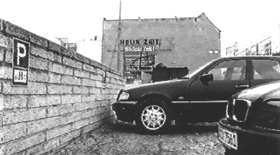|
On the wall of an old building behind a muddy parking lot next to the rising skyscrapers of the Potsdamer Platz in the center of Berlin, a small advertisement from the old times, when the city was divided and different currencies were used on the two sides of "the wall", momentarily catches the eyes of the drivers, leaving their cars and running hastily to their offices. "Neue Zeit" – "New Times" – says the banner and only former East Germans remember that the "Neue Zeit" was the daily newspaper of the Christian Democratic Union (CDU) of the German Democratic Republic. The "Neue Zeit" doesn't exist anymore. The divided city is united and people on both sides of the former "iron curtain" have the same money in their pockets. The only difference now is that some have more than others. The division of a city has turned into a division among people. While some are struggling for their daily survival, hunting for some "Kleingeld" ("small money" or better "change"), others are gambling with millions to make "big money" ("Grossgeld") bigger and bigger. Is this the message the author wants to tell us in his 15 minute short film "Kleingeld"? The story of the film is simple: Every day, a banker meets a disabled homeless beggar in the street next to the entrance to his office at the Potsdamer Platz. Each day, he gives him some change, one or two Deutschmark, until he discovers that the homeless man is washing his car, on the dirty parking lot. After discovering this, the banker talks to the beggar, explaining that the "change" is not a "salary" for a "service" but a "gift" and that there is no need to wash the car. But the homeless beggar continues washing his car. One day, the banker, who is very busy with a "big Japanese deal", tries to avoid the beggar, and takes another exit when he leaves the office. The homeless man, waiting for the "daily gift", discovers the banker very late when he is already sitting in his big BMW and is leaving the parking lot. The banker backs out slowly while the beggar runs forward and a collision is unavoidable. While fortunately no serious harm is done, the accident changes the relationship between the two men. Next morning, no homeless beggar is waiting in front of the bank's entrance. But the banker, who wants to excuse himself for the accident, searches for him and finally finds him around another corner in front of the entrance to another bank. When the banker offers to give the beggar 100 Deutschmark, the homeless man turns around and moves away without a word, leaving the solitary banker behind him in Berlin's rush hour with a face full of questions. The film does not need a lot of language. It tells its story directly with pictures and all the clichés needed to illustrate the human and material distance between the two extreme poles which mark the playing field of today's highly developed German society. The 15 minutes of the film are long enough to remind us that the unification of two countries did not overcome the division between individuals. The 15 minutes tell us something about dignity and responsibility. But they are too short to give answers to the film's questions, raised without words. | ||
|
